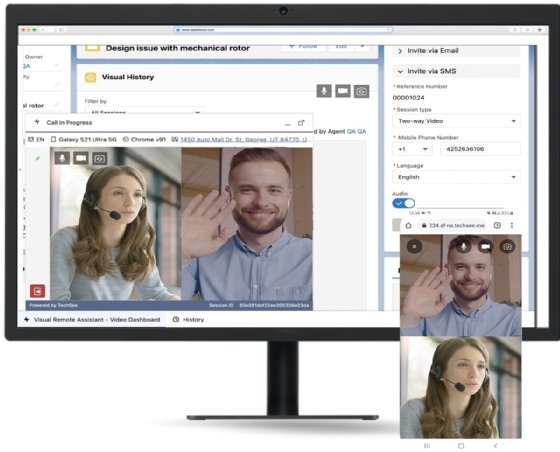
Getty Images/iStockphoto
Salesforce Field Service adds scheduling, Lightning web tools
Salesforce turns its attention to field service technology development, bringing mobile app and web experiences more in line with consumer-grade customer service.
Salesforce Field Service has new features to help developers build consumer-like experiences, including self-service scheduling, digital signatures and Lightning Web Components.
Available now are Appointment Assistant Self-Service Scheduling, which enables users' customers to cancel appointments with a technician. Scheduling changes are based on user-defined rules such as "cancellations allowed up to 24 hours before the scheduled visit," which is key for technicians in trucks, who often follow meticulously planned routes with specific parts and tools loaded for a particular day's work.
Also available now in Salesforce Field Service -- formerly Lightning Field Service -- is Visual Remote Assistant Two-Way Video, which grew out of a partnership with TechSee, an AI computer vision company. This feature gives remote customer service agents or remote technicians access to a customer's smartphone video to diagnose and solve issues -- either an agent helping the customer directly, or a veteran technician remotely assisting a colleague in the field.
These Salesforce Field Service features, along with previous features such tracking maps that show customers where the technician is en route to their house or commercial facility, are the latest sign of a convergence of consumer-friendly contact center service and field service, which often have their own software and contract structure.
Two things are driving this trend: Field service needs to catch up to the expectations set by customer-centric consumer companies, and millennial generation decision-makers are demanding better field service and more control over the experience, explained Brent Leary, founder of CRM Essentials.

"The ability to provide really great customer experience, when they need it, is going to be a game changer in terms of who can do that best," Leary said. "We all want as much control as possible over what we do and how we spend our time."
Of course, such features require a lot of back-end support. One example, said Paul Whitelam, general manager of field service management at Salesforce, is the appointment cancellation feature. To offer rescheduling availabilities, the platform needs access to a driver's planned routes as other service tickets come in. That data analysis has to be shown quickly in an app.
Remote assistance wave of customer service future
Many vendors either have added or are in the process of adding remote video capabilities to their service platforms, said Predrag Jakovljevic, an analyst at Technology Evaluation Centers. Both IFS and Zoho offer the feature in their customer service platforms.
Who will be the early adopters of these features? "Almost anyone who needs to fix issues on complex assets," Jakovljevic said, "and in situations where some expert from a remote location can help you with the instructions or even remotely mark the parts to replace and show you how to do it using augmented reality."
Another trend driving remote-assist features and better field service in general, both Leary and Whitelam said, is the staying power of remote work. Visual remote access makes the customer part of the service experience and can, in theory, reduce expensive in-person visits from technicians in trucks.
Lightning Web Components extend to field service
Currently available in pilot, Lightning Web Components for Field Service will enable field service teams to build workflows and functionalities into web and mobile apps that Salesforce sales, marketing and customer service teams can develop. Those will make subscription services more straightforward to build, and enable integrators to build vertical-specific apps they can offer to users.
They can also improve employee experience, automating processes such as data entry that field service workers now perform manually.
"Our customers and systems integrators can very quickly build these reusable applications using components that scale -- built in a way that works across browsers," Whitelam said. "We provide the source code; we provide the documentation. Organizations can get up and running with these rich user interfaces very quickly."
Salesforce also expanded a longstanding agreement with electronic signatures vendor DocuSign to manage tracking, enforcing and updating key service contract terms across departments. This feature, which will automate many currently manual processes around service providers meeting their contractual obligations, will include AI components and will be added in 2022.
DocuSign's partnership that adds these workflows to Salesforce Field Service is part of a broader agreement between the two companies. It includes planned features for configure-price-quote documentation, contract templates and Slack-based collaboration agreements, among others.
Don Fluckinger covers enterprise content management, CRM, marketing automation, e-commerce, customer service and enabling technologies for TechTarget.







